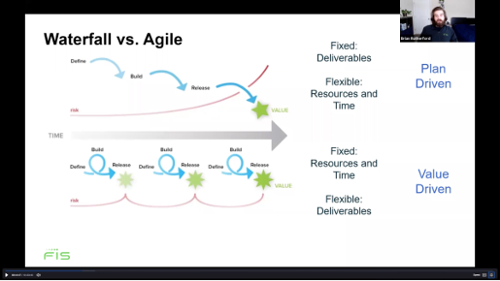CEC students learn Agile methodology from leading industry company

Despite virtual classes continuously dominating college life, interactive workshops are still thriving.
The agile workshop was held on Jan. 28, during the first week of classes, over Zoom. The presentation was hosted by two employees from FIS Global, a Fintech (financial technology) production company.
Agile is a way of working in the professional world. In the old method (waterfall), a whole product was designed all at once and then taken to the customer. If the customer didn’t like it, the whole product had to be fixed from the beginning.
Agile avoids that. 
The Agile method is based on three things: iterations, customer interaction and minimum viable product (MVP). The idea is to get a product out there (MVP), get feedback (customer interaction) and then fix/improve the product based on the feedback (iterations).
Brian Rutherford, a 2020 University of Cincinnati (UC) graduate and one of the hosts of the workshop, said he sees Agile as key in the future of professional engineering.
“What this is doing is giving basically all of these companies, small or large, the competitive edge against each other to kind of produce a product very quickly and pivot where they need to,” Rutherford said. “That’s the big thing we always say, ‘if you’re gonna fail, you gotta fail fast.’”
Speaking to his own experience at UC, Rutherford said there wasn’t a huge emphasis on Agile in any of his classes. Carson McCarthy, a sophomore computer science major, echoed this point.
“We obviously learn about it in class, but just a quick, two-hour workshop to really hammer it home is really nice … I would 100% say it was worth my time,” McCarthy said.
Because of Covid-19, the workshop took place in a virtual format, which added a unique challenge for the interactive activity during the workshop. Usually, the students perform different iterations on paper airplanes, improving them based on customer feedback.
This year, the students created different iterations of an apartment, receiving explicit directions from their “customers” (AKA the hosts of the workshop).
Dr. Amit Shukla, department chair of mechanical and manufacturing engineering and organizer of the event, said the adapted activity may have actually been more helpful than the normal one.
“Utilizing the digital tools was also highlighted in this workshop because most of the time, even beyond the pandemic, engineering teams are usually dispersed,” Dr. Shukla said. “So to learn how to work digitally across geographical boundaries is a valuable asset for our students to learn.”
Daniel Yokajty, a 2020 CEC alum, said it was particularly special for him to come back and teach students at his alma mater. As a UC alum, Rutherford put it generally:
“Hearing from the people in industry was always something I really enjoyed, so now that I’m in industry, I wanna do it as much as I can because I think it’s extremely valuable.”
Rutherford and Yokajty are grateful to Dr. Shukla for spearheading this subject in the CEC. But Dr. Shukla said he is grateful to FIS for expanding the walls of the classroom with the workshop.
“We really value the support we received from FIS Global,” Dr. Shukla said. “Because they are really the industry expert in this technology. I mean, we bring a certain perspective in teaching, but they bring a different, much more valuable perspective because they apply it on a daily basis. So hearing from them has a lot more value for our students than what it would be if it was just teaching a class.”
Dr. Shukla said he hopes to organize another workshop on Agile in the future, and he encourages students to take advantage of the opportunity to learn from industry professionals.
By Maggie Peña, CEC Reporter

